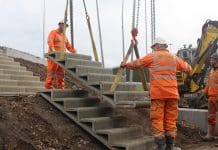Angela Mansell, managing director of Mansell Building Solutions, explores the role offsite and MMC have to play in the future of construction
Construction is in the midst of a period of accelerating change and the need to modernise the way we build has never been stronger.
Carbon targets and net zero policies mean we have to work towards adopting new materials and methods to deliver our built environment.
The gaping hole in the housing supply and our inability to fill it year in and year out is a testament to the fact that we’re not getting it right. What’s more, with skilled tradespeople leaving the industry and precious few coming in from the younger generation to replace them, the industry finds itself languishing, pining for skillsets that just aren’t out there anymore.
So what to do?
We can’t go on as we are. The status quo isn’t working anymore and traditional methods cannot and will not deliver us into a safe and prosperous future. By the same token, we can’t simply say, “Things will change in the future”.
This outlook is putting the onus on someone else to solve our problems for us. A positive future is earned and we have to start laying the foundations now for genuine change.
From where I sit, as a country and as an industry one thing we can start doing in the here and the now is whole-hearted and considered embracing of offsite and MMC.
While it’s not a silver bullet that will solve all our problems, it’s a methodology that allows us to react to a changing world and adapt to the modern construction landscape.
Embracing MMC for an evolving industry
The housing crisis unpacked
The UK’s housing crisis is a multifaceted challenge that requires an equally multifaceted response. Traditional construction methods, while tried and tested, are increasingly inadequate to meet the soaring demand for quality, affordable housing.
The task here is no small thing. The target (which Sunak’s government has recently stepped back from) is 300,000 new homes per year. We haven’t come anywhere near that target since it was set.
So how does MMC come into the picture?
Let’s be frank, the housing supply issue is bigger than simply HOW you build homes. It’s an issue which has roots in everything from planning regulations to a shrinking labour market. But while it’s not a sufficient solution on its own, my view is that building the amount of homes we need will not happen without offsite and MMC.
MMC allows us to significantly shorten build times, make fewer time-consuming mistakes and make systemisation much easier to achieve than traditional methods.
All of this is a quick and easy way to help us make progress towards those golden housing targets.
Carbon reduction and the quest for net-zero
Offsite and MMC stand at the forefront of the net-zero challenge, offering sustainable building solutions that minimise waste and energy consumption. It’s not carbon neutral of course, but it’s significantly easier to reduce that carbon output meaningfully with the MMC approach.
The controlled factory environment that comes with offsite construction ensures precise material usage and significantly less waste. Also, the reduced need for on-site activity drives emissions down because, when there’s less time spent on site, there’s less machine usage and fewer vehicles.
By adopting these methods, we not only contribute to the fight against climate change but also set a standard for responsible construction.
Bridging the skills gap
What do we do about all the expertise leaving the industry? The obvious answer would be to ensure there’s enough fresh blood coming through to replace those leaving our trade. But that’s just not happening. Before the global financial crisis, there were 2.6m employees in construction. Today there are 2.1m. But it’s worse than that. Another 500,000 still in the industry are over 55, meaning another half a million are on the road to retirement within the next decade.
The truth is obvious, the dwindling influx of young talent is down to traditional construction roles often being perceived as less appealing to the younger generation. As an industry, we’ve failed to make it an attractive career path.
How do offsite and MMC change that?
MMC and offsite construction offer a solution through the utilisation of technology and automation, requiring a different set of skills that will appeal more to young people, including digital literacy and precision engineering. This shift not only addresses the immediate labour shortage but also aligns with the broader educational and career aspirations of the younger generation, ensuring the industry’s sustainability.
As a methodology, MMC also requires much less labour than traditional methods, so while it offers a way for us to change the profile of who we attract to the industry, we also need fewer people to do it.
Broadening the appeal of construction to women
The traditional image of construction is rapidly changing, thanks in part to the adoption of offsite and MMC. A prevailing stereotype of construction workers paints a particular picture. Namely, big strong men who are resilient to the physical trials of working on a building site. Within that stereotype, how much room is there for women?
Whether that stereotype of traditional construction is accurate or not, does the same apply to the offsite/MMC model?
Offsite and MMC demands a diverse range of skills, from design and engineering to project management, opening the door to a more varied workforce. Importantly, offsite construction, with its emphasis on precision and planning over physical strength, is dispelling the “big strong builder” stereotype and creating more opportunities for women in the industry. By fostering a more inclusive environment, we not only address the skills gap but also enrich the industry with diverse perspectives, leading to more innovative and effective solutions.
The way forward
The future of construction lies in our ability to adapt and innovate. Offsite and MMC offer a pathway to not only address current challenges but also to lay the groundwork for a more sustainable, efficient, and inclusive industry. By embracing these methods, we can build faster, reduce our environmental impact, bridge the skills gap, and create a more diverse workforce.
At Mansell Building Solutions, we’re committed to leading this change. By advocating for the integration of offsite and MMC from the earliest stages of design, we ensure seamless, high-quality projects that meet the evolving needs of our industry and society. Together, with a shared vision and collaboration across the sector, we can pave the way to a brighter future for construction and the built environment.
The construction industry is poised for a renaissance, one that promises not only to meet the immediate demands of our time but also to inspire future generations to build a world that is sustainable, efficient, and inclusive for all.

Angela Mansell
Managing director of Mansell Building Solutions

















